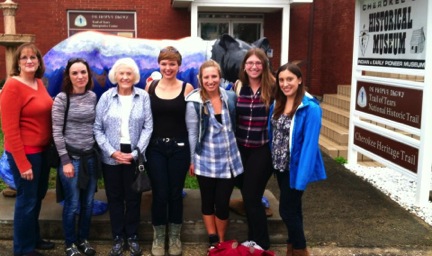By Katherine Makepeace – 2014

Fate is a funny thing. We never know when a great coincidence will occur, nor can we foretell the extent to which an event will alter the course of history – in ways that are both tremendous and innocuous.
One of the great ironies of our trip began in Murphy, the night of our arrival at the Days Inn. After our long drive, I began to wonder how our interactions with locals would shape our travels. Now that we’re here, how will our itinerary work out? Will we have any significant leads? Will we have enough time in each town to hunt down some good stories? With a million questions running through my mind about how we should pursue our research, we entered the hotel lobby and approached the woman running the front desk for check-in.
Like most people we met in Murphy, she asked what the heck we were visiting for. She was suddenly excited when we described our research to her, and told us she had a great lead for us. An elderly woman and her family had just arrived at the same hotel, she said. The woman, from Oregon, has Cherokee roots in the area, and is doing some research of her own about her family’s origins. Unaware of the deep significance that Cherokee history held in this particular town, I was ecstatic about this lead because I grew up next to the other prominent Cherokee reservation near Maggie Valley, NC. Some of my old friends live on the reservation, and many more have at least some amount of Cherokee blood in their veins. I would argue, however, that 1/16 Cherokee blood does not a Cherokee make. Rather, the cultural significance of Cherokee traditions in one’s life is a more appropriate measure. This elderly Cherokee woman, I thought, was bound to have experienced Cherokee culture first-hand in her childhood. We left one of our cell phone numbers at the front desk for the woman, and I hoped that she would call.
The next day, we loaded ourselves in my car for a trip to the Murphy courthouse and the Cherokee County Historical Museum. After we made an appointment with the magistrate, we went next door to the museum whereupon a family informed us that it had just closed. We were dismayed, but we stood there and talked with this amicable family for a few minutes before the great irony surfaced. “Are you that research group?” they asked. Stunned, I thought, wow. Our reputation precedes us! How do they know? It turned out that this family of four – a grandmother, a mother, a son and a daughter – were the ones researching the matriarch’s Cherokee family origins. And we had simply bumped into them on the street, like fate.
Stunned at the coincidence, we gathered and spoke for a while in front of this large, colorful bear statue. It was painted in the colors and imagery of the 7 Cherokee clans: the Bird, Wolf, Deer, Wild Cat, Wind, Paint, and Wild Potato clans. Cherokee clanship was passed down in a matrilineal fashion, and people always married outside of their clan since their fellow clan members were perceived as their family. The family matriarch stood in front of me, a gentle, quiet, and supremely kind individual, and I wondered about how her mother – keeper of her clan’s language and traditions – influenced her upbringing. She told me that she remembers her mother singing Cherokee songs to her in their traditional language, and she recalled being told a particular story about a rabbit that she loved as a child. Her ancestors, held captive by the American government in Murphy’s Fort Butler for the Trail of Tears, had survived the trek west and passed their traditions down to her.
And now, although she does not recall much of the language anymore, she is able to share this knowledge with her own descendants. Two generations of her own family had the opportunity to bear witness to their own matriarch’s journey of identity and self-discovery, so that the Cherokee legacy will never be forgotten. The immediate fate of those subjected to the Trail of Tears was atrocious, ripped from the lands that they loved, cherished, and protected by imperial forces. But – fate is a funny thing. Without fate, we never would have stumbled across this warm and fascinating family, or bore witness to the continuation of Cherokee history and culture – an act that gives me great hope for the future. Without fate, we never would have been a part of her journey, and she never would have been a part of ours.
